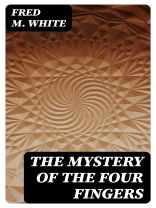In ‘The Mystery of the Four Fingers’ by Fred M. White, readers are taken on a suspenseful journey filled with intricate plots and clever twists. Set in the late 19th century, this detective novel reflects the popular mystery genre of the time, characterized by its thrilling narrative and engaging storytelling. The author’s descriptive prose and attention to detail effectively immerse the reader in the mysterious world of crime and deception. With unexpected revelations and an engaging plot, this book is sure to captivate fans of classic mystery fiction. Fred M. White showcases his talent for crafting suspenseful narratives in ‘The Mystery of the Four Fingers’, making it a must-read for lovers of the genre. As an accomplished author in the early 20th century, White’s experience and skill shine through in this captivating mystery novel, solidifying his reputation as a master storyteller. Fans of classic detective fiction will appreciate the clever plot twists and engaging narrative of this thrilling novel, making it a highly recommended read.
About the author
Fred M. White, born in 1859 in Westward Ho!, Devon, England, distinguished himself as a prolific author in the genre of crime and mystery fiction during the late 19th and early 20th centuries. His literary career spanned across several decades, during which he penned an extensive array of novels and short stories largely forgotten with time, yet are now regarded as significant contributions to the foundations of the detective and thriller tales. Among his numerous works, ‘The Mystery of the Four Fingers’ stands out as a hallmark of his cunning plot construction and suspenseful storytelling. First published in 1908, it elucidates White’s fascination with the unexpected twists and the human psyche’s darker corridors. Characterized by a narrative that weaves through the sinister underbelly of London to unravel a compelling mystery, the book remains a testament to White’s masterful command over the mystery-thriller domain. His works, although not as widely recognized today, played a pivotal role in shaping the detective genre. White’s stories are frequently laced with tension and intrigue, carrying his distinctive approach to storytelling, which combines realistic detail with the melodramatic flair of the era. The themes he explored resonate with the anxieties and fascinations of the Edwardian public, convergent with the work of his contemporaries like Conan Doyle and Chesterton but imprinted with his unique stylistic touch. Fred M. White passed away in 1935, leaving behind a rich legacy that continues to be an object of academic interest and a pleasure for aficionados of classic crime fiction.












